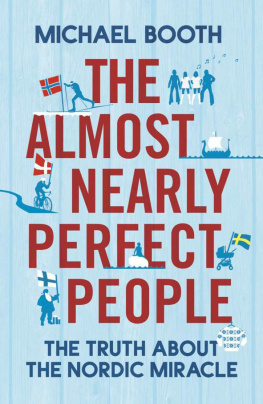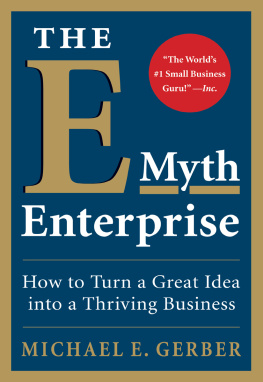Michael Booth - The almost nearly perfect people: behind the myth of the Scandinavian Utopia
Here you can read online Michael Booth - The almost nearly perfect people: behind the myth of the Scandinavian Utopia full text of the book (entire story) in english for free. Download pdf and epub, get meaning, cover and reviews about this ebook. year: 2015, publisher: Vintage Books;Random House, genre: Art. Description of the work, (preface) as well as reviews are available. Best literature library LitArk.com created for fans of good reading and offers a wide selection of genres:
Romance novel
Science fiction
Adventure
Detective
Science
History
Home and family
Prose
Art
Politics
Computer
Non-fiction
Religion
Business
Children
Humor
Choose a favorite category and find really read worthwhile books. Enjoy immersion in the world of imagination, feel the emotions of the characters or learn something new for yourself, make an fascinating discovery.
- Book:The almost nearly perfect people: behind the myth of the Scandinavian Utopia
- Author:
- Publisher:Vintage Books;Random House
- Genre:
- Year:2015
- Rating:4 / 5
- Favourites:Add to favourites
- Your mark:
- 80
- 1
- 2
- 3
- 4
- 5
The almost nearly perfect people: behind the myth of the Scandinavian Utopia: summary, description and annotation
We offer to read an annotation, description, summary or preface (depends on what the author of the book "The almost nearly perfect people: behind the myth of the Scandinavian Utopia" wrote himself). If you haven't found the necessary information about the book — write in the comments, we will try to find it.
Michael Booth: author's other books
Who wrote The almost nearly perfect people: behind the myth of the Scandinavian Utopia? Find out the surname, the name of the author of the book and a list of all author's works by series.
The almost nearly perfect people: behind the myth of the Scandinavian Utopia — read online for free the complete book (whole text) full work
Below is the text of the book, divided by pages. System saving the place of the last page read, allows you to conveniently read the book "The almost nearly perfect people: behind the myth of the Scandinavian Utopia" online for free, without having to search again every time where you left off. Put a bookmark, and you can go to the page where you finished reading at any time.
Font size:
Interval:
Bookmark:
Contents
About the Book
The whole world wants to learn the secrets of Nordic exceptionalism: why are the Danes the happiest people in the world, despite having the highest taxes? If the Finns really have the best education system, how come they still think all Swedish men are gay? Are the Icelanders really feral? How are the Norwegians spending their fantastical oil wealth? And why do all of them hate the Swedes?
Michael Booth has lived among the Scandinavians, on and off, for over ten years, perplexed by their many strange paradoxes and chracter traits and equally bemused by the unquestioning enthusiasm for all things Nordic that has engulfed the rest of the world, whether it be for their food, television, social systems or chunky knitwear.
In this timely book he leaves his adopted home of Denmark and embarks on a journey through all five of the Nordic countries to discover who these curious tribes are, the secrets of their success and, most intriguing of all, what they think of each other. Along the way a more nuanced, often darker picture emerges of a region plagued by taboos, characterised by suffocating parochialism and populated by extremists of various shades.
They may very well be almost nearly perfect, but it isnt easy being Scandinavian.
About the Author
Michael Booth contributes to numerous British and foreign magazines and all of the UKs broadsheet newspapers. He is the author of four works of non-fiction: Eat, Pray, Eat , which was nominated for a British Travel Press Award in 2012; Just As Well Im Leaving , nominated for the Irish Times first writers award; Sacr Cordon Bleu , a BBC Radio 4 Book of the Week; and Sushi and Beyond , winner of the Guild of Food Writers award in 2010. He lives in Denmark with his wife and children.
BY THE SAME AUTHOR
Just As Well Im Leaving
Doing without Delia
Sushi and Beyond
Eat, Pray, Eat
To Lissen, Asger and Emil
The Almost Nearly Perfect People
The Truth About the Nordic Miracle
Michael Booth

Introduction
EARLY ONE DARK April morning a few years ago I was sitting in my living room in central Copenhagen, wrapped in a blanket and yearning for spring, when I opened that days newspaper to discover that my adopted countrymen had been anointed the happiest of their species in something called the Satisfaction with Life Index, compiled by the Department of Psychology at the University of Leicester.
I checked the date on the newspaper: it wasnt 1 April. Indeed a quick look online confirmed that this was headline news around the world. Everyone from the Daily Mail to Al Jazeera was covering the story as if it had been handed down on a stone tablet. Denmark was the happiest place in the world. The happiest ? This dark, wet, dull, flat little country that I now called home, with its handful of stoic, sensible people and the highest taxes in the world? Britain was forty-first on the list. A man at a university had said it, so it must be true.
Well, they are doing an awfully good job of hiding it, I thought to myself as I looked out of the window at the rain-swept harbour. They dont seem all that frisky to me. Down below, cyclists swaddled in high-visibility Arctic gear crossed the Langebro together with umbrella-jostling pedestrians, both battling the spray from passing trucks and buses.
I thought back to the previous days soul-sapping adventures in my recently adopted homeland. In the morning there had been my twice-weekly encounter with the sullen check-out girl at the local supermarket who, as was her habit, had rung up the cost of my prohibitively expensive, low-grade produce without acknowledging my existence. Outside, other pedestrians had tutted audibly when Id crossed the street on a red light; there was no traffic, but in Denmark pre-empting the green man is a provocative breach of social etiquette. I had cycled home through the drizzle to find a tax bill relieving me of an alarming proportion of that months income, having along the way provoked the fury of a motorist who had threatened to kill me because I had infringed the no-left-turn rule (literally, he had rolled down his window and, in the manner and accent of a Bond villain, shouted, I vill kill you). The evenings prime-time TV entertainment had consisted of a programme on how to tackle excessive chafing of cow udders, followed by a ten-year-old episode of Taggart , and then Who Wants to Be a Millionaire? its titular, life-altering rhetoric somewhat undermined by the fact that a million kroner are worth only around 100,000, in Denmark just enough to buy you a meal out with change for the cinema.
This, I should add, was long before all those critically acclaimed Danish TV series hit the screens and New Nordic cuisine revolutionised our kitchens, long before Sarah Lund charmed us with her knitwear and Birgitte Nyborg seduced us with her pencil skirts and no-nonsense attitude to right-wing politicians, and long before the recent, seemingly ceaseless wave of Danish mania gripped the world. Back then, I had come to think of the Danes as essentially decent, hard-working, law-abiding people, rarely prone to public expressions of... well, anything much, let alone happiness . The Danes were Lutheran by nature, if not by ritual observance: they shunned ostentation, distrusted exuberant expressions of emotion, and kept themselves to themselves. Compared to, say, the Thais or Puerto Ricans or even the British, they were a frosty, solemn bunch. I would go as far as to say that of the fifty or so nationalities that I had encountered in my travels up to that point, the Danes would probably have ranked in the bottom quarter as among the least demonstrably joyful people on earth, along with the Swedes, the Finns and the Norwegians.
Perhaps it was all the antidepressants they were taking that was fogging their perception, I thought to myself. I had read a recent report which said that, in Europe, only the Icelanders consumed more happy pills than the Danes, and the rate at which they were popping them was increasing. Was Danish happiness nothing more than oblivion sponsored by Prozac?
In fact, as I began to delve deeper into the Danish happiness phenomenon I discovered that the University of Leicester report was not as ground-breaking as it might have liked to think. The Danes came top of the EUs first ever well-being survey the Eurobarometer as long ago as 1973, and are still top today. In the latest one, more than two-thirds of the thousands of Danes who were polled claimed to be very satisfied with their lives.
In 2009 there was the papal-like visit to Copenhagen of Oprah Winfrey, who cited the fact that people leave their children in buggies outside of cafs, that you arent worried they will get stolen... that everyone isnt racing racing racing to get more more more as the Daness secret to success. If Oprah was anointing Denmark, it must be true.
By the time Oprah descended from the heavens I had actually left Denmark, having finally driven my wife to the very end of her tether with my incessant moaning about her homeland: the punishing weather, the heinous taxes, the predictable monoculture, the stifling insistence on lowest-common-denominator consensus, the fear of anything or anyone different from the norm, the distrust of ambition and disapproval of success, the appalling public manners, and the remorseless diet of fatty pork, salty liquorice, cheap beer and marzipan. But I still kept a wary, slightly bewildered eye on the Danish happiness phenomenon.
I shook my head in disbelief when, for example, the country topped the Gallup World Poll, which asked a thousand people over the age of fifteen in 155 countries to rate, on a scale of 1 to 10, both their lives now and how they expected them to pan out in the future. Gallup asked other questions about social support (If you were in trouble, do you have relatives or friends you can count on to help you whenever you need them?); freedom (In your country, are you satisfied or dissatisfied with your freedom to choose what you do with your life?); and corruption (Is corruption widespread within businesses located in your country?). The answers revealed that 82 per cent of Danes were thriving (the highest score), while only 1 per cent were suffering. Their average daily experience scored a world-beating 7.9 out of 10. By way of comparison, in Togo, the lowest-ranked country, only 1 per cent were considered to be thriving.
Next pageFont size:
Interval:
Bookmark:
Similar books «The almost nearly perfect people: behind the myth of the Scandinavian Utopia»
Look at similar books to The almost nearly perfect people: behind the myth of the Scandinavian Utopia. We have selected literature similar in name and meaning in the hope of providing readers with more options to find new, interesting, not yet read works.
Discussion, reviews of the book The almost nearly perfect people: behind the myth of the Scandinavian Utopia and just readers' own opinions. Leave your comments, write what you think about the work, its meaning or the main characters. Specify what exactly you liked and what you didn't like, and why you think so.








